How a Vietnamese priest brought the first Asian night market to this Conn. town
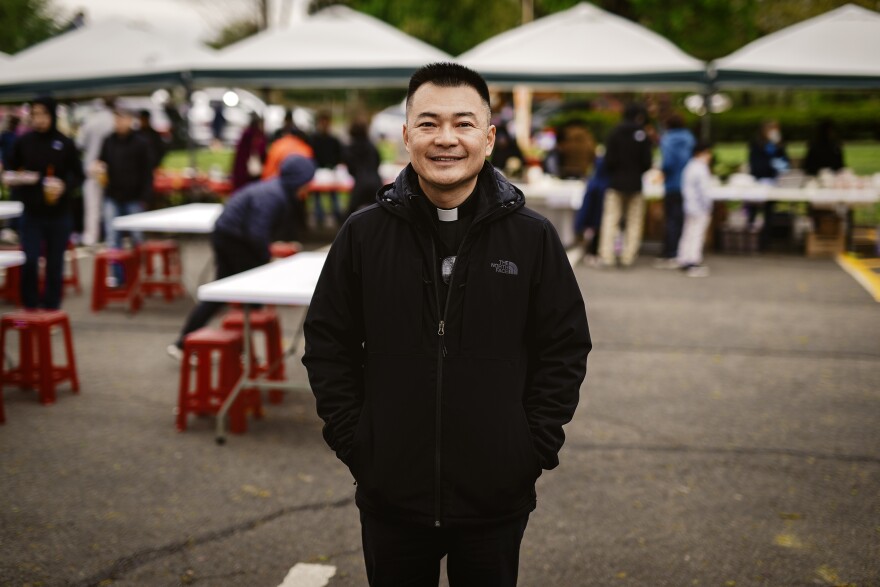
Father Andy Mai is pastor of St. Andrew Dũng-Lạc Parish, a Vietnamese Catholic community that worships at St. Mark the Evangelist Church in West Hartford, home of the Asian night market. He created the experience in 2019 to bring the community closer together. (Tony Spinelli / Connecticut Public)
Father Andy Mai strolled through stalls of vendors amid a bustling night market in West Hartford, Conn. Bowls of noodles, sizzling meat on skewers and deep-fried seafood pancakes attracted hungry neighbors and visitors from all over the state.
“Everything is so good, you have to try everything!” Mai said with a laugh.
Mai is the pastor of St. Andrew Dũng-Lạc Parish, a Vietnamese Catholic community that worships at St. Mark the Evangelist Church in West Hartford, where the Asian population accounts for about 8.4% of residents. But the community is growing statewide. Connecticut’s Asian American and Pacific Islanders (AAPI) population saw a 30.6% increase from 2010 to 2020, representing about 5% of the state’s population.
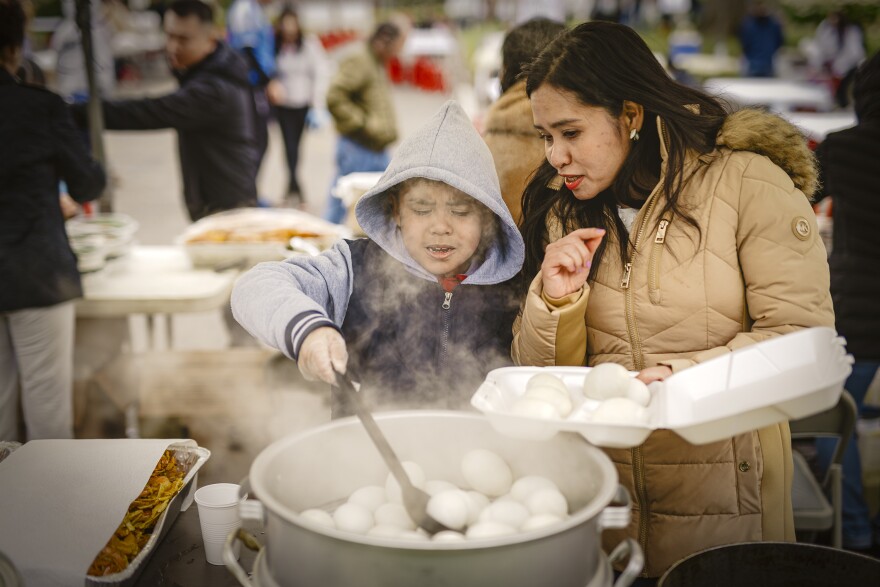
At the Asian night market in West Hartford, people find comfort in familiar food and languages. Michael Salazar lends a helping hand at a young age as he plates steamed eggs alongside Jennifer Nguyen. (Tony Spinelli / Connecticut Public)
The idea to create a summer night market came to Mai about three years ago. He wanted to give Connecticut’s Asian community a familiar place to go with their family and friends. Twice a month from May to October, the church’s parking lot is transformed into a typical street market that’s popular in Vietnam and many other regions in Asia. With the rise of anti-AAPI hate crimes and incidents across the nation, Mai believes it’s even more important now to give his community and beyond a sense of home.
“This is an opportunity to help make people’s lives better,” he said. “The country is in a difficult place right now, and it’s my goal to make people happy. It’s my way of bringing happiness and a little culture to everyone, not just for the Vietnamese people.”
Mai came to the U.S. in 2009 as a Vietnamese refugee, escaping from his communist-run homeland. After several attempts to escape, his brother was the first to be accepted into the U.S. in 1985 as a refugee, and relocated to Omaha, Nebraska. He got his citizenship in 2001 and sponsored their parents, who in turn sponsored Mai and his other two siblings seven years later.
Mai spoke no English when he arrived. He said it was a difficult and challenging process.
“If you don’t put yourself in my position or in an immigrant’s position, it’s hard to understand how challenging it is for someone to face a completely different culture and language,” he said. “When I have my priest collar on, I’m respected. When I don’t, I’m treated differently.”
About 11,000 anti-Asian hate incidents have been documented by Stop AAPI Hate from the start of the pandemic to last year. Stop AAPI Hate tracks national anti-Asian hate incidents. About 6 out of 10 incidents reported by elderly AAPIs involve verbal harassment or shunning, and AAPI elders are most likely to experience hate incidents on public streets and at businesses.
Over 60% of documented incidents were related to harassment, with physical assault making up about 16%. About 62% of all reports were made by women.
In 2020, about 65% of Connecticut’s hate incidents were racially motivated, up from 48% in 2019.
The fear is very real, said Hanh Long, who met her husband, Toan Nguyen, at a refugee camp in Thailand. They came to the U.S. together in 1983 and have three children. Watching the news and seeing images of violence against people who look like Long hits hard.
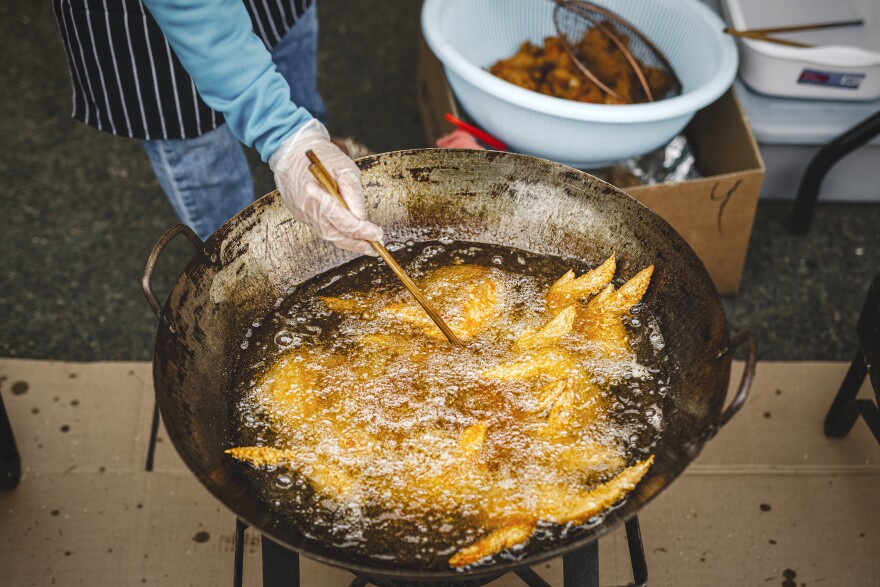
Mai Le cooks and prepares food, including egg rolls, chicken wings and fried sesame balls for the Asian night market guests. (Tony Spinelli / Connecticut Public)
“I feel so sad that the incidents happen to, you know, Asian Americans, from New York City, from California, and how they got beat up suddenly. The old and elderly, it’s so scary,” Long said.
Nguyen said they have faced discrimination, though not like the more recent physical attacks.
“I feel pity for the people who did that kind of act. Because they probably were so — what do you call it? — stonewalling in a certain quarter of their own thinking,” he said.
He said they are grateful to have the freedom to do a lot of things that they could not have done in Vietnam. But seeing such hate against the Asian community is hurtful to him.
“Come on, give me a break. This is 21st century,” Nguyen said. “Yes, we are different in certain things yes, different look, whatever. But we’re still human beings, and humanity is what we should look for and try to protect each other.”
Despite the hard conversations, the couple said seeing a packed traditional night market with familiar aromas and sounds is comforting.
When the couple first moved to West Hartford, they said the Asian community was small, and no one publicly celebrated holidays like Lunar New Year. They would never have imagined that a few decades later, they would be serving traditional meat skewers at an Asian night market in Connecticut.
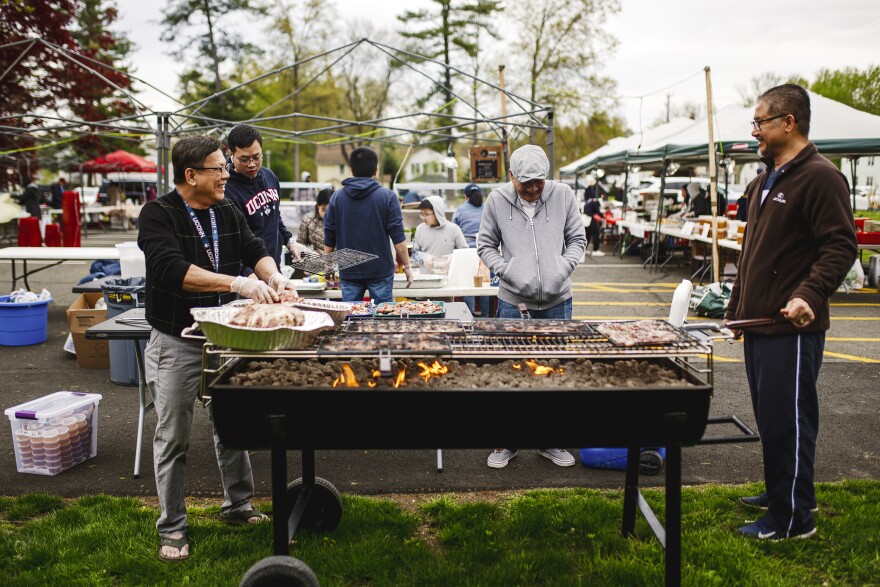
Preparations are made before the start of the Asian night market in West Hartford, Conn. (Tony Spinelli / Connecticut Public)
As guests line up for their grilled meats, Nguyen said what makes it “Vietnamese” is the classic ingredients.
“Just basic things that Vietnamese use daily, like lemongrass,” he said.
“And things like shallots, garlic, five spices, soy sauce … we have honey, what else … I can’t remember,” Long said, laughing.
“Don’t tell all the secret!” Nguyen said.
Nguyen and Long may not share their secret recipe. But what they will share is the love for their culture and comfort through the universal language of food.
The night market will be held June 18, July 2 and July 16, Aug. 6 and Aug. 20, Sept. 3 and Sept. 17, and Oct. 1 and Oct. 15, 2022.
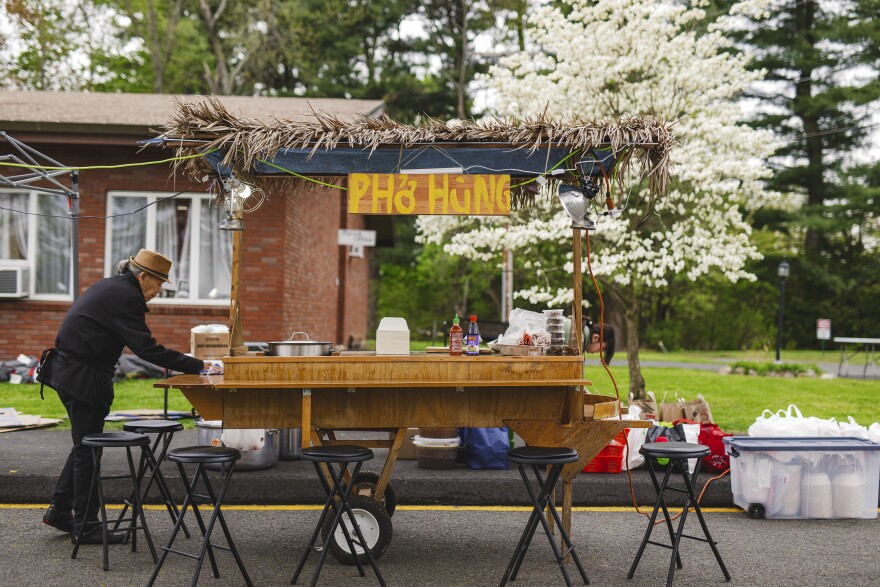
Preparations are underway at the Pho Hung cart, which serves hot soups to guests at the Asian night market in West Hartford, Conn. (Tony Spinelli / Connecticut Public)
